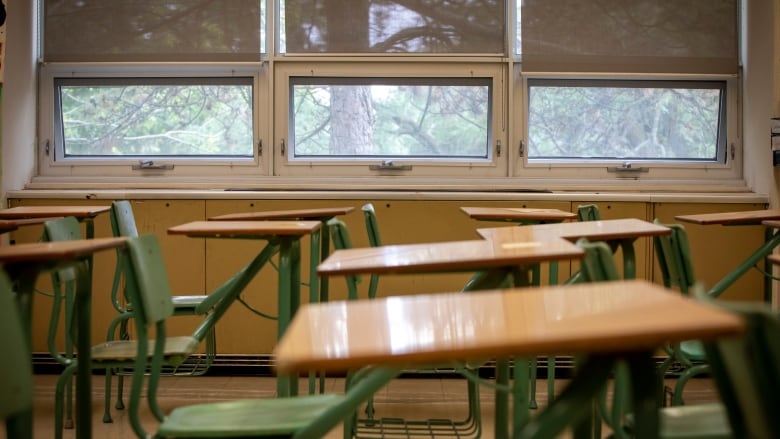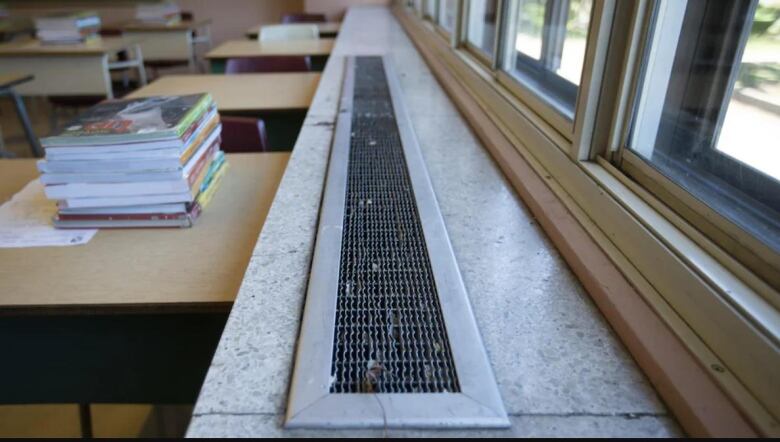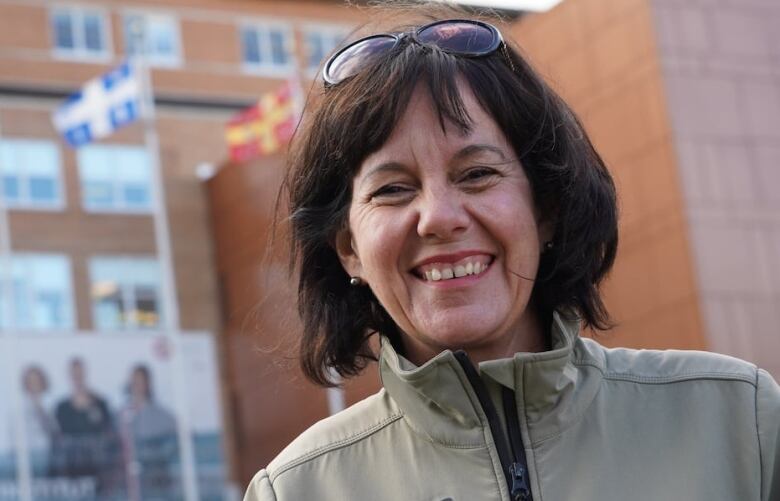As winter approaches, Quebec has yet to produce plan for ventilation in classrooms
Many older buildings don't have air filtration systems and opening the windows will prove a chilly solution

At the start of the school year, as worries around airborne transmission of COVID-19 began to increase, Quebec public health suggested schools should keep windows open as much as possible to encourage the circulation of air.
Now, with months of cold weather on the horizon, the prospect of letting gusts of cold air into classrooms is less appealing.
"We're concerned that it might be a bit too cold for teachers and students to have it during snowstorms," said Carol Heffernan, assistant director general of theLester B. Pearson School Board.
Instead of waiting for a government solution, the board is spending half-a-million dollars on new, portable machines for schools without mechanical ventilation.
"So after reviewing all the literature and doing some research, we decided to purchase HEPA air purifiers for all the schools that are naturally ventilated," she said.
The LBPSB is also upgrading the filters inside schools that are already equipped with mechanical ventilation. They ordered the special filters several months ago and they are set to arrive next week, saidHeffernan.

The English Montreal School Board put out a statementWednesday indicating that they plan to wait foran announcement from the Ministry of Education and the recommendations from public health before purchasing their own air purifiers.
"Until then we will continue to use our mechanical or natural ventilation systems, which continue to be the most effective procedure. We have always had to air out our classrooms by opening windows and that will not change, even with air purifiers," wroteEMSB Chair Joe Ortona.
As the number of health agencies statingthat COVID-19 can be spread throughaerosol transmission rises, Quebec still doesn't have a plan for how to ventilate public buildings like schools that aren't already equipped with air filtration systems.
The Public Health Agency of Canadaand the World Health Organization both state that aerosol transmission is a risk, but Quebec is waiting for recommendations from its own public health department before taking action.
Asking students to bundle up
At the Capitale school service centre in Quebec City, the recommendationof opening windows as often as possible is still being applied.
The service centre is already planning to ask students to come dressed warmly to school, in an effort to stave off the chill from the open windows.
Another concern brought up by the Quebec federationof teachers' unions is that open air circulation isn't even an option for all schools.
"There are plenty of schools built in the 1970s and the classes don't even have windows," said federation presidentJose Scalabrini.
Caroline Duchaine, amicrobiologist with expertise in aerosols fromUniversit Laval, told CBCNews that "addressing air quality should be somethingthat is a priority" and that it's been largely "neglected" as a prevention method.
"Now we know better about the survival of the virus in the airborne state," she said. "So now we have to think about renewing the air to dilutethis concentration of contaminants."
Duchaine said that "ventilation shouldbe a major approach to prevent transmission," and that while opening the windows gets the job done, complaints about temperature can't be ignored.
"Of course, deploying devices such as portable air filtration units is also something to be considered becauseit can be pretty useful and prettyefficient in reducing the amount of airborne contaminants," she said.

School-aged children and teens accountfor a growing percentage of Quebec's rising COVID-19 case count a worrying trend, said Kim Lavoie, professor and Canada Research Chair in behavioural medicine at the University of Quebec at Montreal.
Lavoieattributes the rise among Quebec school-aged children and teens in part to a lack of preventative measures used by schools in other provinces such as mandatory mask-wearing across a wider age range of students since the start of the school year.
"When you have classrooms of 30-plus kids and poor ventilation, the solution cannot be to simply open the windows during our long, cold winters," she said.
In a news conference on Tuesday, Health Minister Christian Dub said that in older buildings, be it schools or CHSLDs, installing new ventilation systems can cause problems when it comes to power supply.
However, he said the government is conversing with experts and working to come up with some recommendations, not just for schools, but for all public buildings that rely on natural ventilation.
Opposition politicians were critical of the government on this issue, suggesting that a plan concerning ventilation should have been created sooner.
"Honestly, there is equipment available today to do this in a more modern way. And this should've been implemented,like, at the beginning of the school year," said Quebec Liberal Party LeaderDominique Anglade.
"It's quite astonishing that the Quebec government still hasn't recognized the importance of aerosols in the spreading of the virus," saidVroniqueHivon, the Parti Qubcois critic for education.
WATCH | COVID-19: What's working in schools and what's not?
With files from Sarah Leavitt, Cathy Senay and Radio-Canada's Flix Morrissette-Beaulieu













_(720p).jpg)


 OFFICIAL HD MUSIC VIDEO.jpg)
.jpg)



























































































